Types of Non-Slip Flooring for Your Bathroom
When it comes to bathroom safety, one of the most critical factors is choosing the right type of flooring. Bathrooms are often exposed to water and moisture, making them particularly prone to slips and falls. This is where non-slip flooring becomes essential, providing a safe surface that reduces the risk of accidents.
Whether you’re renovating or building a new bathroom, selecting the appropriate non-slip material can enhance both the safety and style of the space. In this blog post, we will explore various types of non-slip flooring options, helping you make an informed decision to keep your bathroom safe and functional.
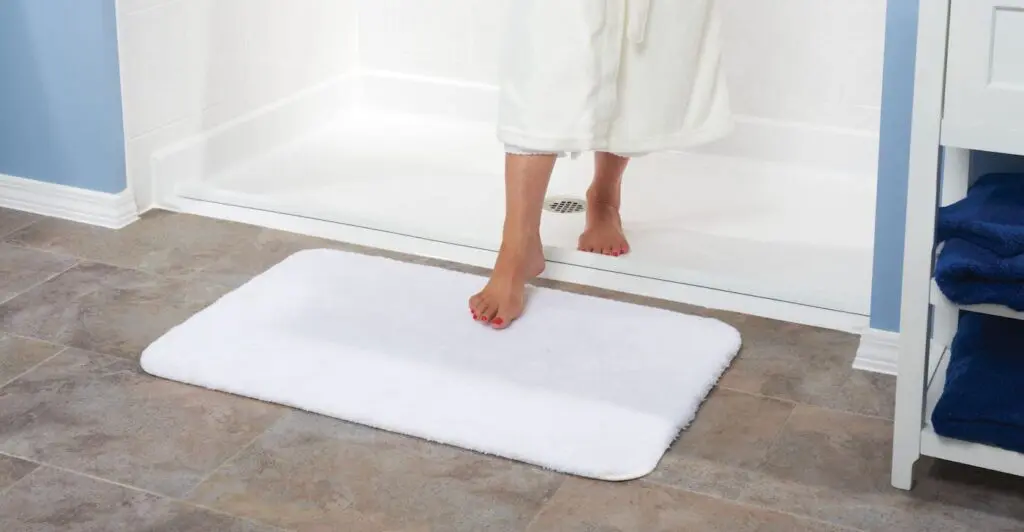
Non-Slip Flooring Options for Bathrooms for Seniors
When renovating a bathroom for senior accessibility, upgrading the shower or bathtub is typically a key component of the remodel. Common changes include installing walk-in showers, adding low-threshold or curbless showers, and replacing traditional bathtubs with walk-in tubs that feature built-in seating and grab bars. These upgrades help seniors maintain independence by providing easier access and reducing fall risks. As these changes often involve removing existing fixtures, it’s an ideal time to upgrade the bathroom flooring to a non-slip option that enhances overall safety and ease of maintenance.
Walk-in showers are popular because they eliminate the need to step over a high tub edge, while low-threshold and curbless showers allow for easy wheelchair access. Walk-in tubs provide a safer alternative for those who still enjoy soaking baths, featuring secure, waterproof doors and anti-slip surfaces. Both shower and tub modifications often include grab bars, non-slip mats, shower seats, and hand-held shower heads to further assist with accessibility.
To complement these upgrades, it’s important to install non-slip flooring to prevent accidents. Non-slip vinyl, textured ceramic tiles, and rubber flooring are some of the most common materials used in accessible bathrooms. These flooring options not only provide safety but also ease of cleaning and durability, essential in high-moisture environments like bathrooms. By combining shower or bathtub renovations with slip-resistant flooring, you ensure a fully accessible and safe bathroom for aging in place.
Pros and Cons of Each Bathroom Flooring Option
Non-Slip Vinyl Flooring
Vinyl flooring is a popular option due to its affordability, water resistance, and wide range of design choices. It is available in both sheet and tile form, with modern vinyl designed to mimic more luxurious materials like wood or stone. Special non-slip coatings or textured finishes further enhance its safety for bathroom use, making it one of the best choices for seniors.
Pros:
- Slip-resistant, especially with textured surfaces
- Waterproof, ideal for moisture-prone bathrooms
- Soft underfoot, reducing the impact of falls
- Affordable and comes in various designs
Cons:
- May lack the premium look of more expensive materials
- Seams between tiles or planks can trap moisture if not sealed properly
- Susceptible to scratches and tears from sharp objects
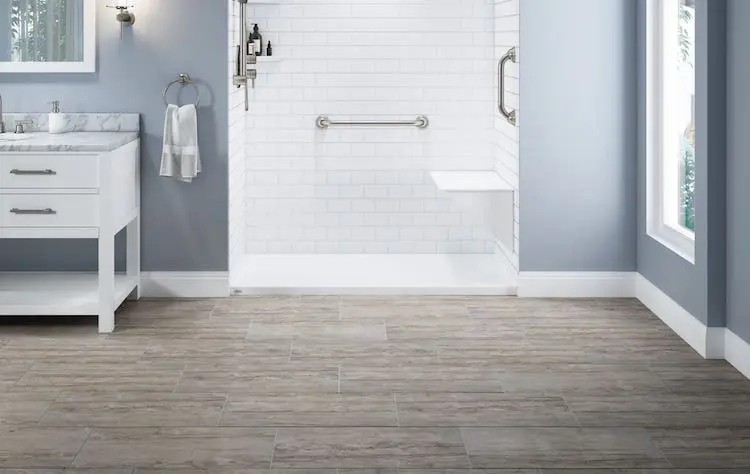
Natural Stone Flooring
Natural stone, such as granite, limestone, or slate, is a luxurious and durable choice for your bathroom. When textured or honed, natural stone offers a naturally non-slip surface, making it safer for seniors. This type of flooring adds an elegant aesthetic, though it requires regular maintenance to ensure long-term safety and water resistance.
Pros:
- Extremely durable and long-lasting
- Textured surface enhances slip resistance
- Adds luxury and high-end value to the bathroom
Cons:
- Expensive, both in terms of materials and installation
- Hard surfaces can increase injury risk if a fall occurs
- Requires sealing to maintain water and slip resistance
- High maintenance cost over time
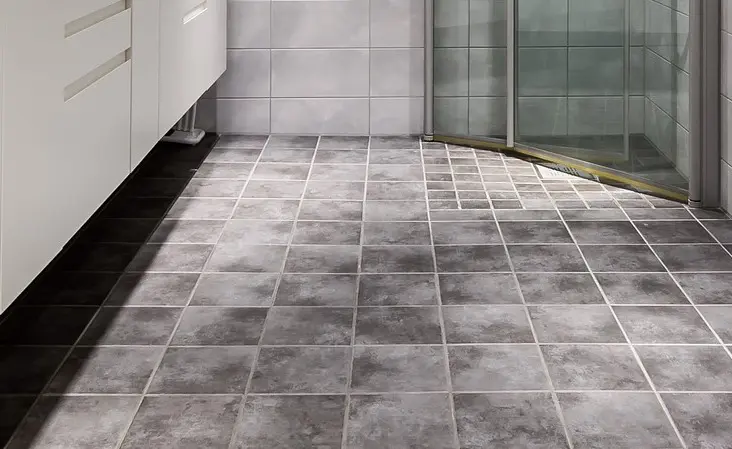
Cork and Bamboo Flooring
Cork and bamboo are eco-friendly, renewable flooring options that can be made slip-resistant. Cork is soft and warm underfoot, absorbing moisture and preventing puddles from forming. Bamboo, on the other hand, offers a more rigid surface but is still softer than traditional wood flooring. Both options are growing in popularity for their sustainability and comfort.
Pros:
- Naturally slip-resistant and absorbs moisture
- Soft, which reduces the impact of falls
- Eco-friendly, renewable materials
- Warm and comfortable underfoot
Cons:
- Prone to moisture damage in poorly ventilated areas
- Susceptible to mold and mildew if not properly maintained
- Limited water resistance, requiring regular sealing
- Less durable than other hard flooring options

Linoleum Flooring
Linoleum is made from natural materials like jute, linseed oil, and cork, making it an environmentally friendly flooring choice. It’s resistant to water and bacteria, and with a non-slip coating, it can be ideal for senior bathrooms. Linoleum is durable and available in a wide range of colors and patterns, allowing for both safety and style.
Pros:
- Water-resistant and easy to clean
- Can be treated with a non-slip coating
- Durable and sustainable material
- Available in various colors and patterns
Cons:
- Requires regular maintenance to ensure slip resistance
- Can become slick when wet without proper coating
- Not as high-end in appearance as other flooring options
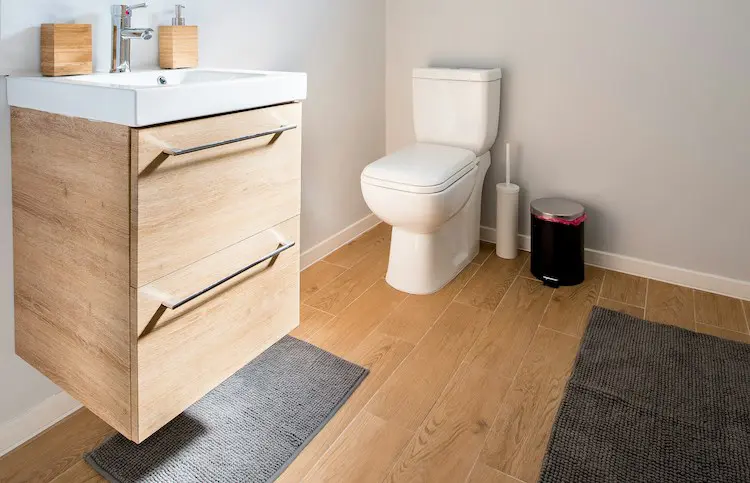
Rubber Flooring
Rubber flooring is known for its exceptional slip resistance, making it one of the safest options for seniors. It is soft and cushioned underfoot, protecting against falls. Rubber tiles or sheets are easy to install and clean, though they are not as commonly used in residential bathrooms due to their industrial look.
Pros:
- Superior slip resistance, even when wet
- Soft and cushioned, reducing injury risk from falls
- Durable and easy to clean
- Waterproof and low-maintenance
Cons:
- Aesthetically less appealing for residential bathrooms
- More expensive than some other options
- Limited color and design options

Ceramic and Porcelain Tiles
Ceramic and porcelain tiles are popular for bathroom floors because they are durable, water-resistant, and come in a variety of styles. While standard tiles can become slippery when wet, there are textured, non-slip varieties designed for wet environments, offering both safety and style. Porcelain is denser and more water-resistant than ceramic, making it a preferred choice for bathrooms.
Pros:
- Highly customizable in terms of color, texture, and size
- Durable and water-resistant
- Non-slip varieties available for added safety
- Affordable compared to other high-end materials
Cons:
- Standard tiles can be slippery if not textured
- Hard surface increases fall injury risk
- Cold underfoot unless heated flooring is installed
- Grout lines require regular cleaning to prevent mold buildup
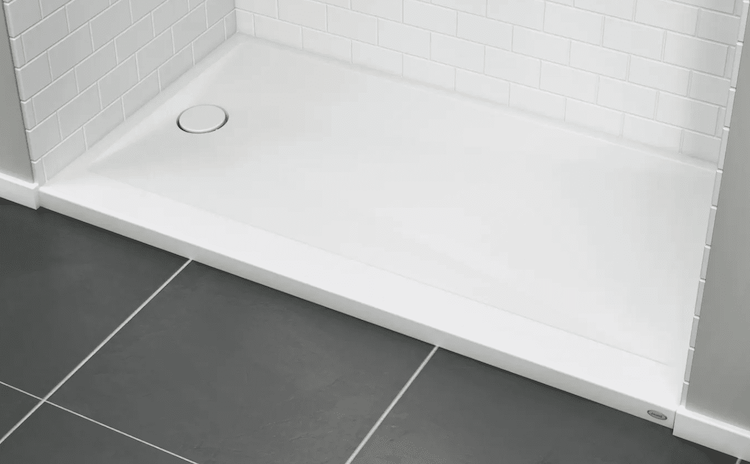
Engineered Hardwood Flooring
Engineered hardwood combines a real wood veneer with a moisture-resistant core, making it a more viable option for bathrooms than traditional hardwood. While it provides a warm and luxurious look, it’s not inherently slip-resistant and requires special treatments to ensure safety in wet environments.
Pros:
- Offers the natural beauty of wood with better moisture resistance
- Warmer and softer underfoot than tile or stone
- Adds value and elegance to the bathroom
Cons:
- Requires special non-slip treatments
- Prolonged exposure to water can cause warping
- Less durable than tile or stone in wet conditions
- Higher maintenance to maintain slip resistance
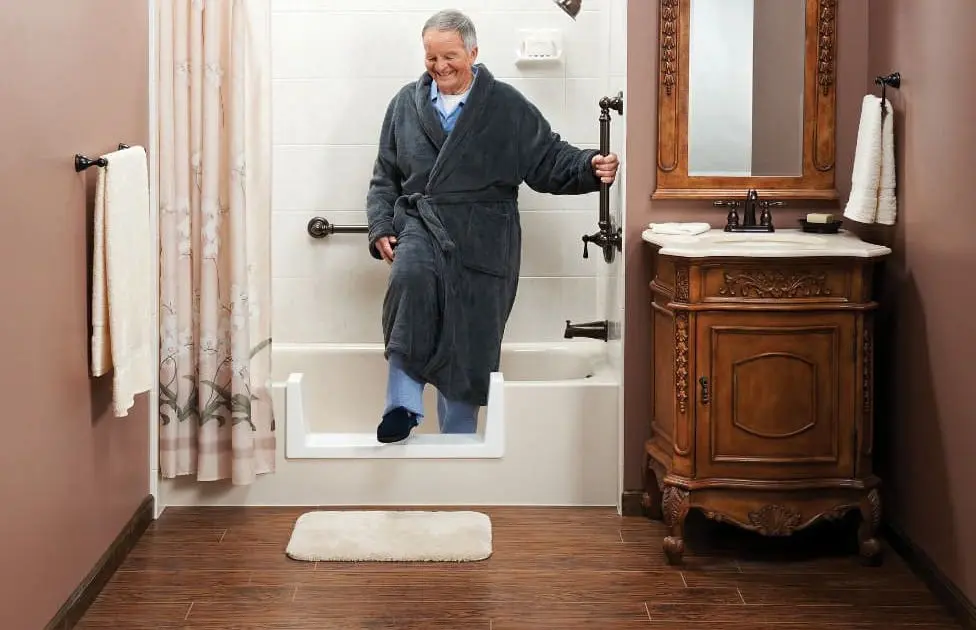
Laminate Flooring
Laminate flooring is a cost-effective alternative that mimics the appearance of wood, stone, or tile. It is water-resistant when properly sealed, but not waterproof. Therefore, it may not always be the best option for bathrooms. However, with a textured surface, it can offer some slip resistance.
Pros:
- Affordable and easy to install
- Available in various designs that mimic more expensive materials
- Some options have slip-resistant textures
Cons:
- Not waterproof; prolonged exposure to water can cause warping
- Seams between planks can trap water, increasing the risk of slipping
- Less cushioned and softer than vinyl or rubber
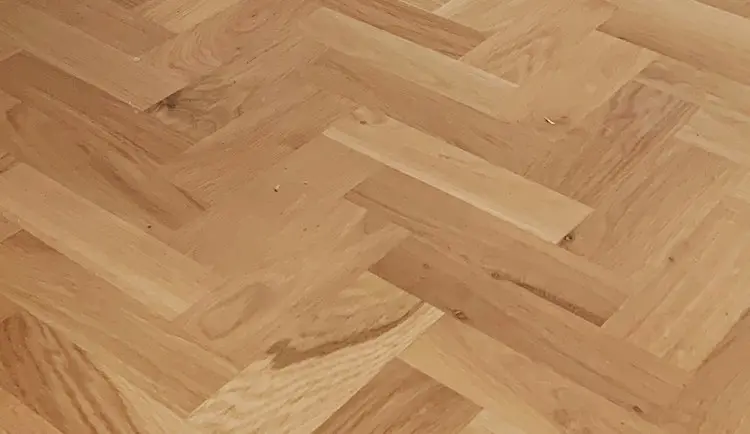
Choosing the Right Flooring for Seniors
For seniors, safety should be the primary factor when selecting bathroom flooring. Non-slip vinyl and rubber are the top choices due to their superior slip resistance, comfort, and durability. For those seeking a more luxurious look, non-slip porcelain tiles or textured natural stone offer a balance of aesthetics and safety, albeit with higher costs. While cork, bamboo, and linoleum offer eco-friendly alternatives, they require careful installation and maintenance to remain effective in wet environments.
Ultimately, the choice should align with both safety needs and aesthetic preferences to create a safe and comfortable bathroom for seniors.
Why Choose Atlas for Your Home Safety Solutions?
As a proud local business, we’re dedicated to serving our community with tailored solutions. Based in Oakland County, we extend our personalized services to surrounding areas. Our team’s commitment to quality and customer satisfaction ensures that we not only meet but exceed your expectations. You can trust us to keep our word and provide the reliable service you deserve for all your home safety needs.
Would you like to learn more about our bathroom safety solutions? We’re here to answer any questions you may have and provide a complimentary quote for your bathroom renovation. Feel free to call us at 844-650-SAFE or reach out online, and we’ll be happy to assist you.










